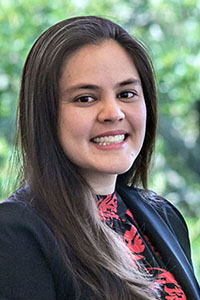Date/Time
Date(s) - 03/08/2021
9:35 am - 10:30 am
Categories
Julie N. L. Albert, Ph.D.
Assistant Professor
Robert and Gayle Longmire Early Career Professor
Chemical Engineering
Tulane University
Title: Solvent vapor annealing processing to obtain non-equilibrium morphologies in polymer thin films
Abstract: Solvent vapor annealing (SVA) is a processing technique used in polymer science that originated as an alternative to thermal processing as a less energy-intensive method that could be used to process polymers susceptible to thermal degradation. Since then, it has become a primary approach for obtaining non-equilibrium morphologies in polymer thin films. In a typical SVA experiment, the polymer film is allowed to equilibrate under a solvent vapor atmosphere, and then the solvent is removed quickly to kinetically trap the annealed structure, which is non-equilibrium under ambient conditions. For block copolymers, whose nano-scale self-assembly in thin films is of interest for bottom-up nanolithographic patterning and fabrication of ultrafiltration membranes, SVA is useful for controlling nanostructure orientation (e.g., cylinders oriented perpendicular to a substrate for patterning nano-dots or providing transport pathways through a membrane). In the first part of my talk, I will show how equilibrium thermodynamic theory can be used to guide solvent selection for SVA of block copolymer thin films. Next, I will draw analogies to semi-crystalline polymers, which like block copolymers, consist of two nano-scale phases (amorphous and crystalline). I will comment on when the analogy fails (due to eventual dissolution of the crystalline phase) and then demonstrate the utility of SVA to produce films with vastly different morphologies but similar overall degree of crystallinity, which may be of interest for (partially) decoupling the physical properties of these materials (i.e., mechanical strength, optical clarity, and bio- or hydrolytic- degradation). Finally, I will conclude with a short vignette on SVA of a polymer blend consisting of a non-crystalline and a semi-crystalline polymer, which can be understood in the context of block copolymer SVA and semi-crystalline polymer SVA.
*Funding Acknowledgements: NSF 1554555 (J. N. L. Albert, NSF CBET CAREER); Beamline 8-ID-E, Advanced Photon Source, Argonne National Lab (U.S. DOE Contract No. DE-AC02-06CH11357).
Bio: Julie N. L. Albert received her B.S. in Chemical Engineering from the University of Florida (UF) in 2005 and her Ph.D. in Chemical Engineering from the University of Delaware (UD) in 2012. Subsequently, she pursued postdoctoral research studies at North Carolina State University (NCSU). She joined the Chemical and Biomolecular Engineering faculty at Tulane University in Jan. 2014 and was promoted to Associate Professor with tenure in Jan. 2021. Albert’s primary research interests are centered on engineering nano- and micro-structured block copolymer and semi-crystalline polymer materials for applications related to technology development in the energy, health, and environmental sustainability sectors. Albert has been the recipient of many awards throughout her academic career, including an NSF Graduate Research Fellowship (2009), a UD Chemical Engineering Teaching Fellowship (2010), the AIChE Women’s Initiative Committee Travel Award (2012), the National Academies Gulf Research Program Early-Career Research Fellowship (2014), and an NSF Early-Career Development Program Grant (NSF-CAREER). In addition to her research-related activities at Tulane, Albert also serves as the faculty advisor for the undergraduate Society of Women Engineers (SWE) and the graduate Women+ in Science and Engineering student organizations on campus. In 2017, she was selected for the Academic Leadership for Women in Engineering (ALWE) Program and an ASSIST Travel Grant to attend the workshop held during the SWE National Conference. She is also an active member of the American Institute of Chemical Engineers (AIChE), serving as programming co-Chair (2019) and then Chair (2020) of Area 8A Polymers at the Annual Conference.

